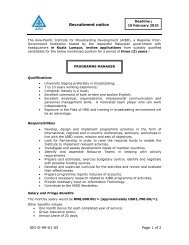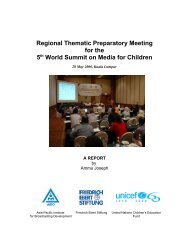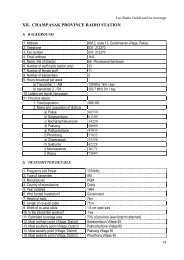FINAL REPORT Media Law to unesco july1.pdf - AIBD
FINAL REPORT Media Law to unesco july1.pdf - AIBD
FINAL REPORT Media Law to unesco july1.pdf - AIBD
Create successful ePaper yourself
Turn your PDF publications into a flip-book with our unique Google optimized e-Paper software.
damage <strong>to</strong> their reputation. For a statement <strong>to</strong> be<br />
defama<strong>to</strong>ry, there has <strong>to</strong> be a degree of stigma attached, he<br />
pointed out.<br />
Dr Iyer then provided the following examples for defamation:<br />
a) attributing criminality<br />
b) accusation of lying, racism or marital infidelity<br />
c) allegations of incompetence or dishonesty in<br />
professions<br />
d) allegations of suffering from a contagious disease<br />
such as Aids.<br />
He went on <strong>to</strong> highlight the significance of defamation in the<br />
context of investigative journalism and said, in general, the<br />
principle of free speech and the issue of reputation has <strong>to</strong> be<br />
balanced. Where <strong>to</strong> draw the line, was sometimes “the most<br />
important and sometimes the most difficult question that<br />
needs <strong>to</strong> be addressed.”<br />
There are three points that a complainant has <strong>to</strong> prove, as Dr<br />
Iyer further elaborated:<br />
• The complainant must be recognized, either directly or<br />
indirectly.<br />
• The defama<strong>to</strong>ry statement has <strong>to</strong> be published.<br />
• The defendant (journalist) must have published the<br />
defama<strong>to</strong>ry statement or be responsible for publication<br />
(e.g. the edi<strong>to</strong>r).<br />
Often, as Dr Iyer stressed, journalists are at a disadvantage,<br />
“because your job is <strong>to</strong> actually prove <strong>to</strong> the satisfaction of<br />
the court that something is true.”<br />
This provoked two questions from the floor, concerning the<br />
role of a witness in proving the truth of an allegedly<br />
defama<strong>to</strong>ry statement. What if the statement is secretly<br />
recorded, asked one participant. Dr Iyer stressed that it helps,<br />
but it may not be enough in court, because “the other side<br />
might challenge the recording”. Another participant wanted <strong>to</strong><br />
know: “What if a witness has signed his or her own<br />
statement?” Dr Iyer said that it was “ok, by and large”, but,<br />
again, the witness might not be willing <strong>to</strong> testify in court.<br />
Dr Iyer went on <strong>to</strong> discuss the concept of “innuendo”, which<br />
applies <strong>to</strong> cases in which something is not stated directly, but<br />
can easily be concluded by the reader. It is interlined. He<br />
cited the example of an anti-smoking campaigner who holds<br />
shares in a <strong>to</strong>bacco company. This clearly implies hypocrisy.<br />
6






